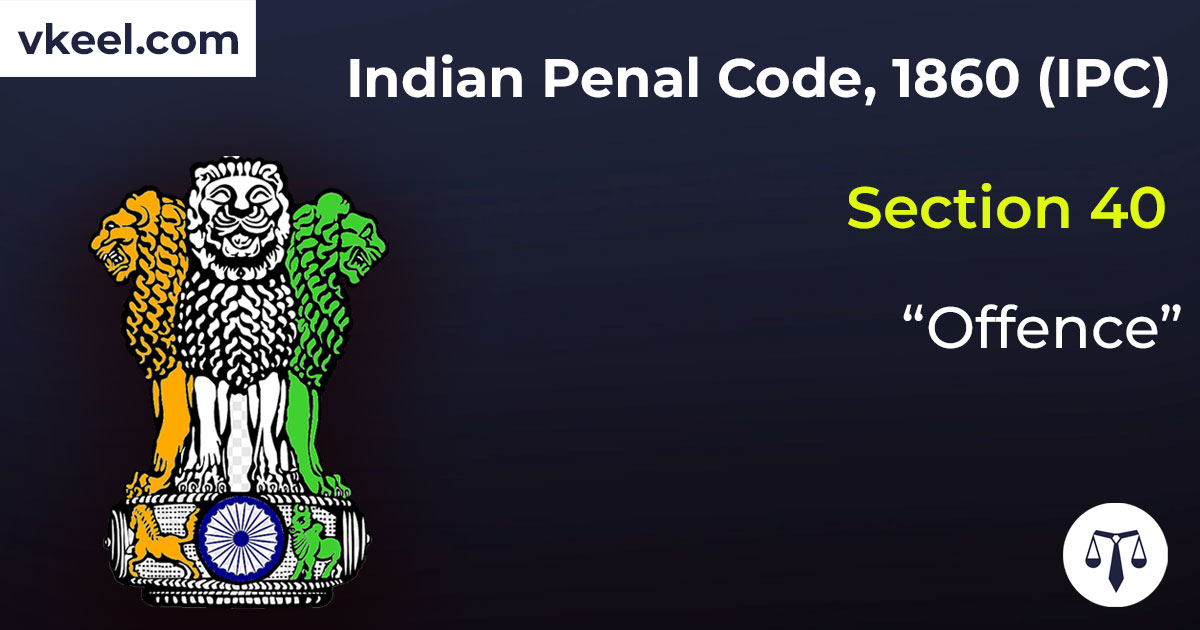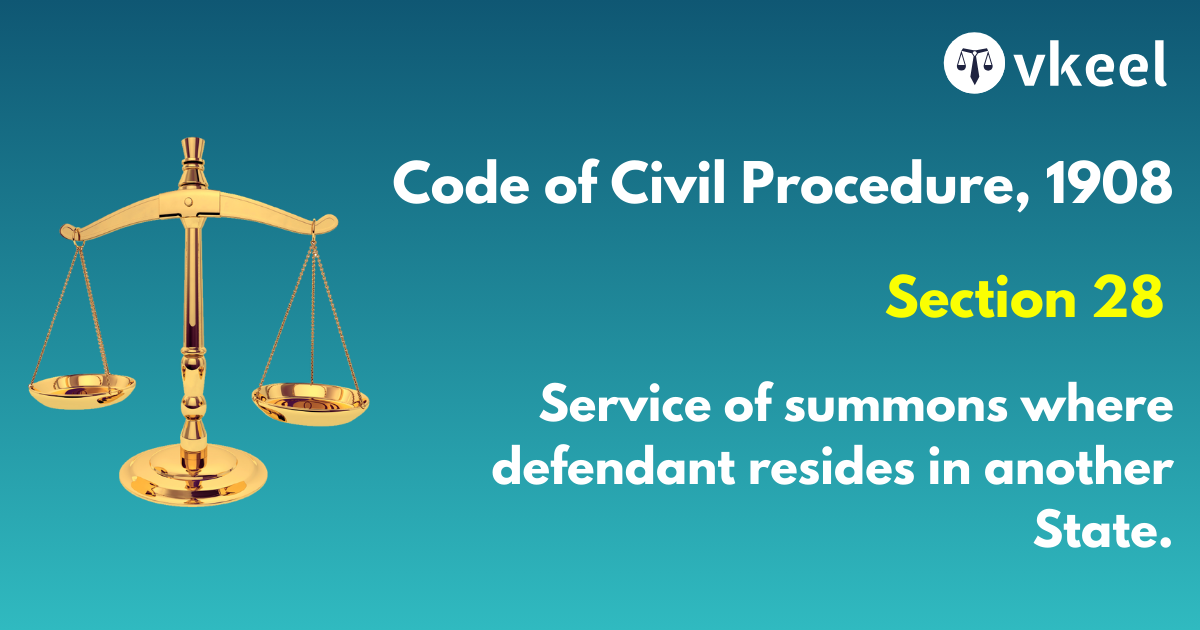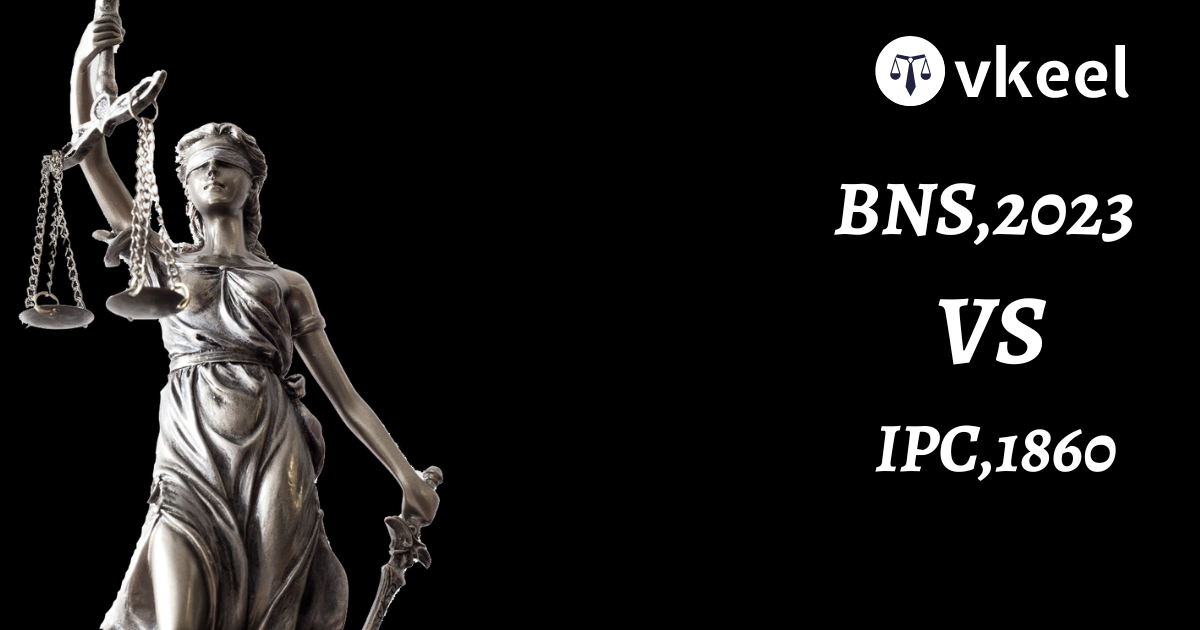Section 40 Indian Penal Code 1860 (IPC) – “Offence”
By Vkeel Team
Table of Contents
Description
“Section 40 Indian Penal Code 1860 (IPC)”
1[Except in the 2[Chapters] and sections mentioned in clauses 2 and 3 of this section, the word “offence” denotes a thing made punishable by this Code.
In Chapter IV, 3[Chapter VA] and in the following sections, namely, sections 4[64, 65, 66, 5[67], 71], 109, 110, 112, 114, 115, 116, 117,6[118, 119 and 120] 187, 194, 195, 203, 211, 213, 214, 221, 222, 223, 224, 225, 327, 328, 329, 330, 331, 347, 348, 388, 389 and 445, the word “offence” denotes a thing punishable under this Code, or under any special or local law as hereinafter defined.
And in sections 141, 176, 177, 201, 202, 212, 216 and 441, the word “offence” has the same meaning when the thing punishable under the special or local law is punishable under such law with imprisonment for a term of six months or upwards, whether with or without fine.]
Definition of Offence
Section 40 of the IPC defines an “offence” as any act or omission made punishable by any law for the time being in force. The term “offence” is a legal term that refers to an act or omission that is punishable by law. In simpler terms, an offense is any act or omission that is considered unlawful, and if proven, may lead to punishment.
Principle of Legality
Section 40 of the IPC lays down the principle of legality, which states that an act can only be considered an offense if it has been expressly defined as such by the law. In other words, a person cannot be punished for an act that is not prohibited by law. This principle is essential in protecting the citizens’ fundamental rights and ensuring that the State does not have arbitrary powers to punish individuals.
The principle of legality is a vital component of criminal law in India, as it ensures that individuals are not punished for actions that are not explicitly prohibited by law. This principle also ensures that the State cannot impose penalties that are not defined by law, thus protecting the citizens’ rights and limiting the government’s powers.
Act or Omission
Section 40 of the IPC also mentions that an offense can be committed by a person either by doing an act or by omitting to do an act that they were bound to do. This means that a person can be held liable for not doing something that they were legally obligated to do, such as failing to report a crime or not fulfilling a contractual obligation.
The principle of omission is essential in ensuring that individuals do not escape liability for their inaction, which may cause harm to others. It also highlights the importance of legal duties and obligations, and the consequences of failing to fulfill them. Thus, Section 40 of the IPC provides a comprehensive definition of “offence” that covers both acts and omissions that are punishable by law, ensuring that criminal behavior is adequately identified and punished.
Offenses under Other Laws
Section 40 of the IPC also includes offenses that are made punishable by other laws for the time being in force. This means that offenses can be defined and punished by statutes other than the IPC, such as the Narcotic Drugs and Psychotropic Substances Act, 1985, or the Prevention of Corruption Act, 1988.
The inclusion of offenses under other laws in Section 40 ensures that the IPC does not limit the scope of criminal behavior that can be punished. This provision also ensures that different laws can work in harmony to punish offenders, and the law can keep up with the changing nature of criminal behavior.
Significance of Section 40
Section 40 of the IPC is a significant provision as it forms the basis of the criminal justice system in India. The definition of “offence” provided by this section is comprehensive and covers all acts and omissions that are punishable by law. This ensures that criminal behavior is adequately identified and punished, and the fundamental rights of individuals are protected.
Furthermore, the principle of legality ensures that individuals are not punished for actions that are not explicitly prohibited by law. This principle protects the citizens’ rights and limits the government’s powers, ensuring that the State does not have arbitrary powers to punish individuals.
The inclusion of offenses under other laws in Section 40 ensures that different laws can work in harmony with each other to punish offenders, making the criminal justice system more effective and efficient. This provision also ensures that the law can keep up with the changing nature of criminal behavior and can adapt to new types of offenses that may emerge.
Section 40 of the IPC is also essential in upholding the rule of law in India. The rule of law requires that all citizens are subject to the same laws and that no one is above the law. By defining “offence” and laying down the principle of legality, Section 40 ensures that the rule of law is upheld and that individuals are held accountable for their actions under the same laws as everyone else.
Furthermore, Section 40 of the IPC is significant in protecting the citizens’ fundamental rights. The principle of legality ensures that individuals are not punished for actions that are not expressly prohibited by law, protecting their right to due process and a fair trial. The inclusion of offenses under other laws also ensures that different laws can work in harmony to punish offenders, ensuring that individuals’ rights are protected, and justice is served.
Conclusion
In conclusion, Section 40 of the Indian Penal Code, 1860 (IPC) is a critical provision that defines the term “offence” and lays down the basic principles of criminal law in India. It ensures that criminal behavior is adequately identified and punished, and the fundamental rights of individuals are protected. By including acts and omissions that are punishable by law and offenses under other laws, the section provides a comprehensive definition of “offence,” which forms the backbone of the Indian criminal justice system.
Furthermore, the principle of legality, acts and omissions, and the inclusion of offenses under other laws make Section 40 an essential provision that upholds the rule of law, protects citizens’ fundamental rights, and ensures that different laws can work in harmony to punish offenders. Thus, Section 40 of the IPC is a vital provision that reflects the values and principles of the Indian criminal justice system, and its significance cannot be overstated.
1. Subs. by Act 27 of 1870, s. 2, for section 40.
2. Subs. by Act 8 of 1930, s. 2 and the First Sch., for “Chapter”.
3. Ins. by Act 8 of 1913, s. 2.
4. Ins. by Act 8 of 1882, s. 1.
5. Ins. by Act 10 of 1886, s. 21 (1).
6. Ins. by Act 10 of 2009, s. 51 (w.e.f. 27-10-2009).
Desctiption Source: indiacode
Disclaimer:
The information provided in the article is for general informational purposes only, and is not intended to constitute legal advice or to be relied upon as a substitute for legal advice. Furthermore, any information contained in the article is not guaranteed to be current, complete or accurate. If you require legal advice or representation, you should contact an attorney or law firm directly. We are not responsible for any damages resulting from any reliance on the content of this website.












